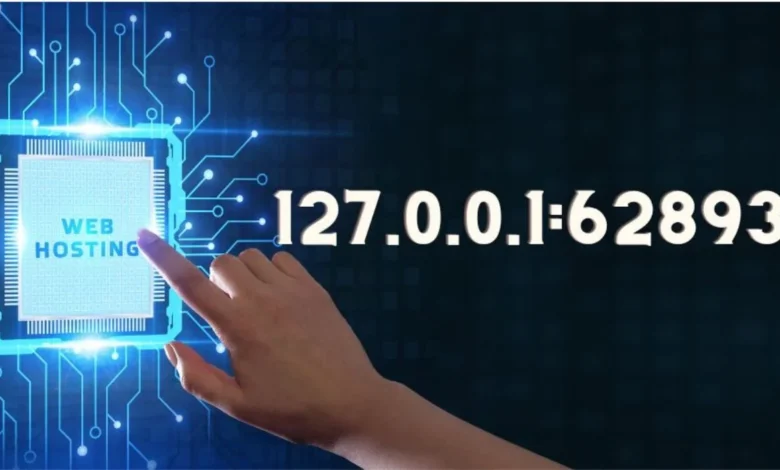Exploring the Significance of 127.0.0.1:62893 in Networking

Understanding the Basics of 127.0.0.1:62893
The notation 127.0.0.1:62893 is a crucial element in networking, specifically relating to local network communications. The IP address 127.0.0.1 is known as the localhost address, which is a loopback interface that enables a computer to communicate with itself. This address is universally reserved for this purpose, allowing developers and network administrators to test applications without needing access to external networks. When a program utilizes the IP 127.0.0.1, it effectively interacts with itself, which is ideal for debugging and testing scenarios.
The significance of localhost, particularly the address 127.0.0.1, extends beyond mere identification; it establishes a communication channel within the same machine. This is especially beneficial in development environments where multiple tests may need to be conducted without affecting external systems. The localhost operates on the network stack just like a regular IP address but does so without requiring physical network hardware, thus making it a versatile tool for developers and systems administrators.
In addition to the IP address, the port number 62893 specifies a unique endpoint for communication. Ports are integral to the TCP/IP protocol suite, as they allow various services to run on a singular IP address. Each application or service listens on a specific port, enabling multiple services to coexist on the same IP. The choice of 62893 as a port number can be arbitrary, as long as it does not conflict with commonly used ports. It serves as a distinguishing feature that helps identify which application is communicating via the localhost.
In summary, understanding the components of 127.0.0.1:62893 is essential for grasping how local network communication functions, the utility of localhost, and the purpose of port numbers in facilitating diverse applications on a single IP address.
Applications and Use Cases of 127.0.0.1:62893
The IP address 127.0.0.1, commonly referred to as the localhost or loopback address, plays a crucial role in networking by enabling devices to communicate with themselves. The port 62893, when used in conjunction with this address, serves specific functions, particularly in software development and network troubleshooting. One of the primary applications of 127.0.0.1:62893 is in the context of testing web applications. Developers often configure their applications to run on local servers to ensure that the software behaves correctly before it is deployed to a live environment. By accessing the application via 127.0.0.1:62893, developers can mimic real-world interactions without the risk of exposing the application to the public internet, thereby maintaining security and control during the development process.

Another significant use case is for running various server types for local development. For instance, a developer might utilize 127.0.0.1:62893 to run a web server, database server, or any other service that requires network communication. This setup allows for safe trials and experimentation with different configurations and features. The ability to have multiple ports available—like 62893—means that developers can run various services simultaneously on the same machine without conflicts, thereby streamlining the development workflow.
Troubleshooting and diagnostics is another critical application of 127.0.0.1:62893. When network problems occur, IT professionals often use this address to verify that their local machine can communicate with network services. By attempting to connect to a service on 127.0.0.1:62893, they can pinpoint whether issues lie within the local environment or the broader network. Utilizing this loopback address is essential for diagnostics, helping streamline identification and resolution of potential problems.
Security Considerations with 127.0.0.1:62893
The use of the address 127.0.0.1:62893, which corresponds to a local server or localhost, brings with it a set of security considerations that must be addressed to safeguard network integrity. While localhost connections are inherently isolated from external threats, improper configurations can lead to vulnerabilities that compromise the security posture of the system. One of the most common issues arises from leaving local servers unprotected, allowing unintended access points that malicious actors could exploit.
To mitigate risks associated with local server implementations, it is essential to ensure that appropriate firewall settings are rigorously enforced. By configuring the firewall to block unsolicited connections, any potentially harmful traffic from the broader network can be deterred. This is particularly crucial when the local server is accessible in a multi-user environment or has network interfaces exposed to public networks. Implementing strict access controls can prevent unauthorized users from gaining access to the sensitive data or applications operating on 127.0.0.1:62893.
Moreover, it is advisable to use secure communication protocols, such as HTTPS, when transmitting sensitive information. Using encryption ensures that data transmitted between clients and the server is not vulnerable to interception or eavesdropping, even on a localhost connection. It is also prudent to regularly update any software or frameworks being used on the 127.0.0.1:62893 server as outdated versions may have known vulnerabilities that security patches could address.
Additionally, applying best practices of segmentation can further enhance security. Isolating environments for development, testing, and production can minimize the impact of a potential breach. By ensuring that local instances are treated with the same level of security rigor as external servers, organizations can maintain a robust defense against both internal and external threats associated with the use of localhost services.
Troubleshooting Common Issues with 127.0.0.1:62893

When working with the local address 127.0.0.1:62893, users may encounter various issues that can impede connectivity and overall performance of local servers. Understanding how to effectively troubleshoot these problems is essential for maintaining a stable networking environment. One of the most common issues involves connectivity problems, which can arise due to a misconfigured firewall or incorrect settings in networking components. It is important to ensure that the firewall allows traffic through the specified port, in this case, 62893. Users should check their firewall settings and make necessary adjustments to permit the required connections.
Another common challenge pertains to port conflicts, which occur when multiple applications attempt to use the same port number concurrently. This can prevent 127.0.0.1:62893 from functioning correctly. Users can utilize tools such as the command-line utility “netstat” to identify which processes are currently occupying the port in question. If a conflict is detected, terminating the conflicting application or changing its port configuration can resolve the issue, allowing 127.0.0.1:62893 to operate as intended.
In diagnosing issues related to the localhost, numerous tools and commands are available to help streamline the troubleshooting process. For instance, the “ping” command allows users to verify their ability to communicate with 127.0.0.1. This tests the local network interface and can uncover potential communication problems. Similarly, using “telnet 127.0.0.1 62893” can assess whether the port is open and ready for connections. These diagnostic tools not only assist in isolating issues but also aid in uncovering the underlying causes of connectivity hurdles. Addressing these common challenges enables users to optimize their interactions with 127.0.0.1:62893 and ensures a seamless networking experience.


